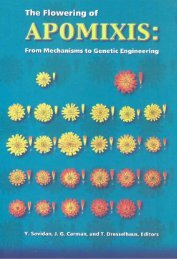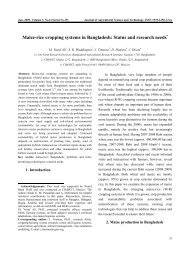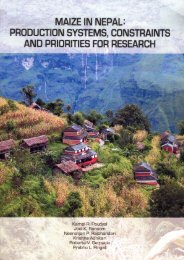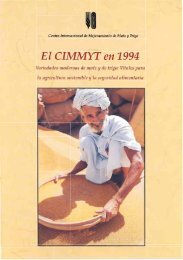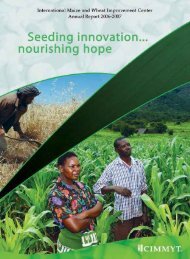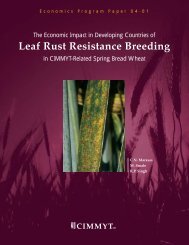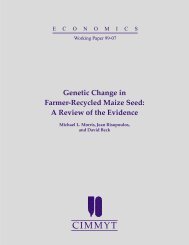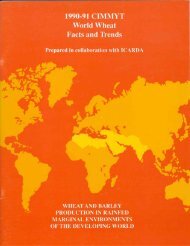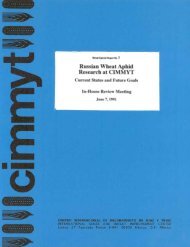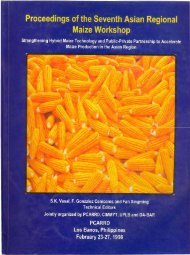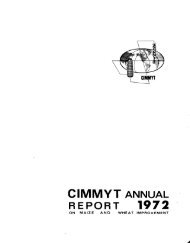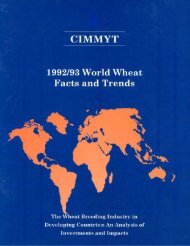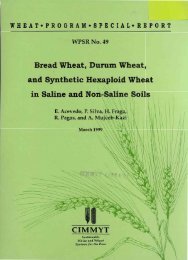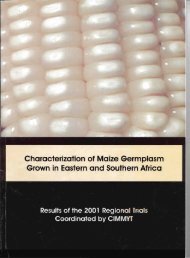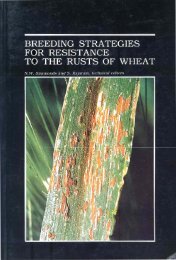Proceedings of the Fifth Asian Regional Maize Workshop - Search ...
Proceedings of the Fifth Asian Regional Maize Workshop - Search ...
Proceedings of the Fifth Asian Regional Maize Workshop - Search ...
You also want an ePaper? Increase the reach of your titles
YUMPU automatically turns print PDFs into web optimized ePapers that Google loves.
CAOOILL MAIZE RESEAFDI ACTIVITIES IN /ISlA<br />
Tunya Kunta .11<br />
Abstract<br />
Cargill Seeds Co., Ltd. is a subsidiary <strong>of</strong> Cargill Co., Ltd, <strong>the</strong> world's largest grain<br />
trading firm. Corn breeding research <strong>of</strong> Cargil Seeds Co., Ltd. in Asia has been carried out in<br />
Thailand and Philippines since 1979. Cargill also has testing sites in India, Pakistan, Indonesia,<br />
and Japan. <strong>the</strong> primary objective <strong>of</strong> Cargill maize research in Asia is to develop high<br />
yielding corn hybrids mostly suitable to environmental conditions and farmer practices for <strong>the</strong><br />
whole <strong>Asian</strong> region. The existing inbreds have been developed by introgressing <strong>the</strong> elite germplasm<br />
from around <strong>the</strong> world into <strong>the</strong> locally adapted germplasm. The resulting hybrids have been<br />
tested over several years and environments before being released to <strong>the</strong> farmers. At present,<br />
cargill commercial hybrids released in <strong>Asian</strong> countries are C-501 (Thailand, Pakistan, and<br />
Indonesia), C-520 (Thailand, Bangladesh, and Philippines), C-633 (India), C-333 (Thailand and<br />
Malaysia), C-777 (Thailand, and Pakistan), CPX-3905 (Philippines), C-744 (Thailand) and C-922<br />
(Thail and).<br />
Cargill Inc., USA's bigge~t private company (Fortune, July 13, 1992), was founded by<br />
William W. Cargill in 1865 as a single grain-storage facility in rural Iowa. During <strong>the</strong> past 128<br />
years <strong>the</strong> company has evolved into a world leader in <strong>the</strong> commodity marketing, transportation, and<br />
processing industries. In 1993, <strong>the</strong> company employed 69,000 people in 47 business in over 55<br />
countries.<br />
Breeding research <strong>of</strong> Cargill Seeds, Ltd. in Asia has been carried out since 1979 in<br />
Thailand and Philippines. Cargill Seeds Ltd. is a subsidiary <strong>of</strong> Car-gill Inc. At present,<br />
Cargi 11 has two main research stations: Pitsanulok, Thai land and Koronadal, South Cotabato,<br />
Philippines. Cargill also has testing sites in India, Pakistan, Indonesia and Japan. The<br />
primary objective <strong>of</strong> <strong>the</strong> two main research stations is to develop corn hybrids that are suitable<br />
to environmental conditions and farmer practices not only for Thailand and Philippines, but also<br />
for <strong>the</strong> whole <strong>Asian</strong> region. Elite germplasm from around <strong>the</strong> world including tropical, subtropical,<br />
and temperate zones has been introgressed into <strong>the</strong> locally adapted germplasm in Thailand and<br />
Philippines. The products <strong>of</strong> <strong>the</strong> introgression are <strong>the</strong> adapted inbreds giving genetic constituents<br />
<strong>of</strong> <strong>the</strong> elite germplasm around <strong>the</strong> world especially <strong>the</strong> subtropical germplasm. The adapted<br />
inbreds with high combining ability are crossed with o<strong>the</strong>r promising inbreds to make new<br />
hybrids. The resulting experimental hybrids are primarily tested over different environments in<br />
Thailand and Philippines. The promising and precommercial hybrids are <strong>the</strong>n tested over several<br />
locations in Thailand, Philippines, India, Pakistan, Indonesia, and Japan. These tests are<br />
conducted at Cargill satellite stations and testing sites by Cargill researchers. The precommercial<br />
hybrids have also been tested in Vietnam, China, and Malaysia via CIMMYT. Specific hybrids<br />
that have been tested over locations and years and that have proved to be suitable to each<br />
country are <strong>the</strong>n registered and released to farmers. Cargill hybrids that have been released in<br />
<strong>Asian</strong> countries and still in <strong>the</strong> market for 1993 are described below.<br />
Cargill 777 main characteristics are: High yield potential (mean yield <strong>of</strong> 8.0 t/ha with<br />
maximum <strong>of</strong> 10.6 t/ha), wide adaptation, long ear, excellent tip filling, good standability, high<br />
shelling percentage, and easy to harvest. Cargill 744 and 922 are our latest releases for <strong>Asian</strong><br />
countries. Cargi 11 744 has high yield potential (si·mi lar to C-777), high level <strong>of</strong> disease<br />
!! Crop Res. Manager, Cargill Seeds Ltd., 6-7th Floor Chokchai International Bldg., 690 Sukumvit<br />
Rd., Bangkok 10110, Thailand.<br />
242



